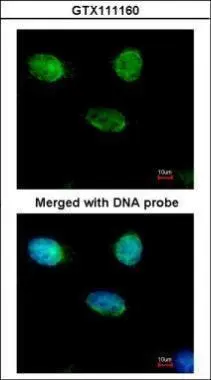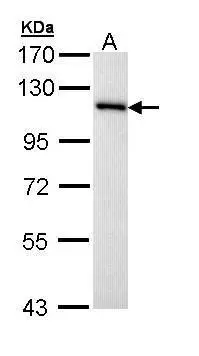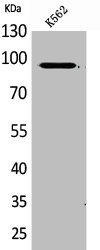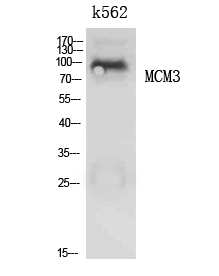
Immunofluorescence analysis of paraformaldehyde-fixed HeLa, using MCM3(GTX111160) antibody at 1:500 dilution.
MCM3 antibody [N1N3]
GTX111160
ApplicationsImmunoFluorescence, Western Blot, ImmunoCytoChemistry, ImmunoHistoChemistry, ImmunoHistoChemistry Paraffin
Product group Antibodies
ReactivityHuman, Mouse
TargetMCM3
Overview
- SupplierGeneTex
- Product NameMCM3 antibody [N1N3]
- Delivery Days Customer9
- Application Supplier NoteWB: 1:5000-1:20000. ICC/IF: 1:100-1:1000. IHC-P: 1:100-1:1000. *Optimal dilutions/concentrations should be determined by the researcher.Not tested in other applications.
- ApplicationsImmunoFluorescence, Western Blot, ImmunoCytoChemistry, ImmunoHistoChemistry, ImmunoHistoChemistry Paraffin
- CertificationResearch Use Only
- ClonalityPolyclonal
- Concentration1 mg/ml
- ConjugateUnconjugated
- Gene ID4172
- Target nameMCM3
- Target descriptionminichromosome maintenance complex component 3
- Target synonymsHCC5, P1-MCM3, P1.h, RLFB, DNA replication licensing factor MCM3, DNA polymerase alpha holoenzyme-associated protein P1, DNA replication factor MCM3, MCM3 minichromosome maintenance deficient 3, RLF subunit beta, cervical cancer proto-oncogene 5, hRlf beta subunit, minichromosome maintenance deficient 3, p102, replication licensing factor, beta subunit
- HostRabbit
- IsotypeIgG
- Protein IDP25205
- Protein NameDNA replication licensing factor MCM3
- Scientific DescriptionThe protein encoded by this gene is one of the highly conserved mini-chromosome maintenance proteins (MCM) that are involved in the initiation of eukaryotic genome replication. The hexameric protein complex formed by MCM proteins is a key component of the pre-replication complex (pre_RC) and may be involved in the formation of replication forks and in the recruitment of other DNA replication related proteins. This protein is a subunit of the protein complex that consists of MCM2-7. It has been shown to interact directly with MCM5/CDC46. This protein also interacts with, and thus is acetlyated by MCM3AP, a chromatin-associated acetyltransferase. The acetylation of this protein inhibits the initiation of DNA replication and cell cycle progression. [provided by RefSeq]
- ReactivityHuman, Mouse
- Storage Instruction-20°C or -80°C,2°C to 8°C
- UNSPSC41116161

![Various whole cell extracts (30 μg) were separated by 7.5% SDS-PAGE, and the membrane was blotted with MCM3 antibody [N1N3] (GTX111160) diluted at 1:500. The HRP-conjugated anti-rabbit IgG antibody (GTX213110-01) was used to detect the primary antibody. Various whole cell extracts (30 μg) were separated by 7.5% SDS-PAGE, and the membrane was blotted with MCM3 antibody [N1N3] (GTX111160) diluted at 1:500. The HRP-conjugated anti-rabbit IgG antibody (GTX213110-01) was used to detect the primary antibody.](https://www.genetex.com/upload/website/prouct_img/normal/GTX111160/GTX111160_40058_20210205_WB_M_w_23060500_132.webp)
![MCM3 antibody [N1N3] detects MCM3 protein at nucleus on mouse colon by immunohistochemical analysis. Sample: Paraffin-embedded mouse colon. MCM3 antibody [N1N3] (GTX111160) diluted at 1:1000.
Antigen Retrieval: Trilogy? (EDTA based, pH 8.0) buffer, 15min MCM3 antibody [N1N3] detects MCM3 protein at nucleus on mouse colon by immunohistochemical analysis. Sample: Paraffin-embedded mouse colon. MCM3 antibody [N1N3] (GTX111160) diluted at 1:1000.
Antigen Retrieval: Trilogy? (EDTA based, pH 8.0) buffer, 15min](https://www.genetex.com/upload/website/prouct_img/normal/GTX111160/GTX111160_40058_20141118_IHC_M_w_23060500_580.webp)

![Mouse tissue extract (50 μg) was separated by 7.5% SDS-PAGE, and the membrane was blotted with MCM3 antibody [N1N3] (GTX111160) diluted at 1:500. The HRP-conjugated anti-rabbit IgG antibody (GTX213110-01) was used to detect the primary antibody. Mouse tissue extract (50 μg) was separated by 7.5% SDS-PAGE, and the membrane was blotted with MCM3 antibody [N1N3] (GTX111160) diluted at 1:500. The HRP-conjugated anti-rabbit IgG antibody (GTX213110-01) was used to detect the primary antibody.](https://www.genetex.com/upload/website/prouct_img/normal/GTX111160/GTX111160_40058_20210205_WB_M_colon_w_23060500_473.webp)






![IHC-P analysis of human esophagus tissue using GTX04424 MCM3 antibody [MSVA-503M] HistoMAX?. Esophageal squamous epithelium with moderate to strong nuclear MCM3 staining of suprabasal and basal cells.](https://www.genetex.com/upload/website/prouct_img/normal/GTX04424/GTX04424_20230728_IHC-P_73_23072722_307.webp)